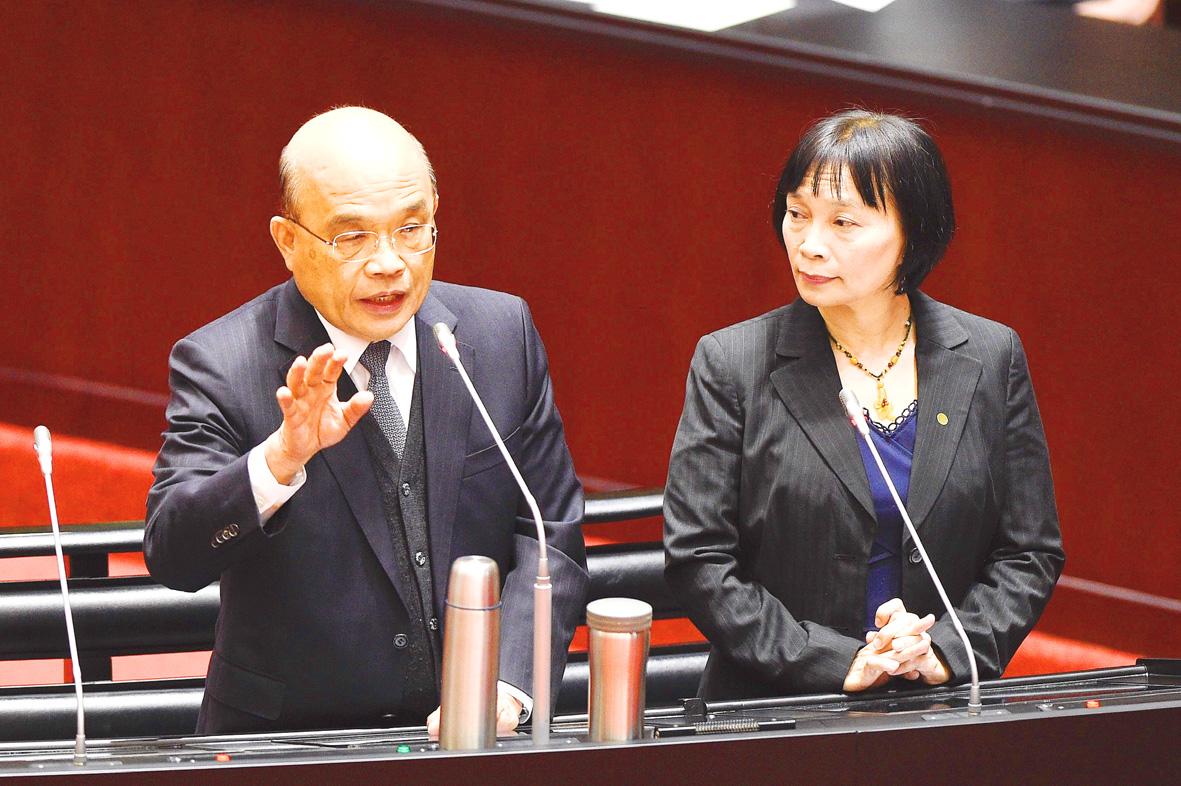The Transitional Justice Commission yesterday said that it is assessing a plan to provide medical services to White Terror victims or their surviving kin.
Commission Acting Chairwoman Yang Tsui (楊翠) made the announcement during a question-and-answer session at the Legislative Yuan in response to queries from Independent Legislator Freddy Lim (林昶佐).
Lim said that other countries have designated centers that help political victims or their families if they have medical conditions related to the political oppression that they experienced.

Photo: George Tsorng, Taipei Times
Many people have physical or mental ailments as a result of their experiences, he said, citing as an example someone who witnessed a family member being tortured to death and, although exhibiting no symptoms when they were young, threatens to pack up and run away.
“The practice of sending these people to psychiatric wards is just putting salt on their wounds,” he said.
Lim called on Premier Su Tseng-chang (蘇貞昌) and the commission to assist these people.
Lim’s remarks made sense, Su said, adding that the government should take steps to provide special care to these brave and stalwart people, who stood up for the rights of others during the White Terror era.
The White Terror era refers to the suppression of political dissidents following the 228 Incident, when protesters were shot on Feb. 28, 1947. The then-Chinese Nationalist Party (KMT) regime subsequently imposed martial law, which was only lifted on July 15, 1987.
Yang said that the commission is assembling volunteers from various disciplines who are involved in commission-backed therapy programs.
The commission also conducts therapeutic interviews, she said, adding that 29 families are enrolled in the program and 34 have completed it.
The commission is also producing short videos to better inform the public about this period, she said.
The commission has considered setting up centers to handle individual appeals for help, with centers made available across the nation so that victims would not need to travel to Taipei, she said.
These centers, if established, would be staffed by professionals from various fields of expertise, Yang said.
The commission has not yet decided whether it should set up an organization or unit to handle these cases, or to collaborate with existing units, she said, adding that the project is still under assessment.

The manufacture of the remaining 28 M1A2T Abrams tanks Taiwan purchased from the US has recently been completed, and they are expected to be delivered within the next one to two months, a source said yesterday. The Ministry of National Defense is arranging cargo ships to transport the tanks to Taiwan as soon as possible, said the source, who is familiar with the matter. The estimated arrival time ranges from late this month to early next month, the source said. The 28 Abrams tanks make up the third and final batch of a total of 108 tanks, valued at about NT$40.5 billion

Two Taiwanese prosecutors were questioned by Chinese security personnel at their hotel during a trip to China’s Henan Province this month, the Mainland Affairs Council (MAC) said yesterday. The officers had personal information on the prosecutors, including “when they were assigned to their posts, their work locations and job titles,” MAC Deputy Minister and spokesman Liang Wen-chieh (梁文傑) said. On top of asking about their agencies and positions, the officers also questioned the prosecutors about the Cross-Strait Joint Crime-Fighting and Judicial Mutual Assistance Agreement, a pact that serves as the framework for Taiwan-China cooperation on combating crime and providing judicial assistance, Liang

A group from the Taiwanese Designers in Australia association yesterday represented Taiwan at the Midsumma Pride March in Melbourne. The march, held in the St. Kilda suburb, is the city’s largest LGBTQIA+ parade and the flagship event of the annual Midsumma Festival. It attracted more than 45,000 spectators who supported the 400 groups and 10,000 marchers that participated this year, the association said. Taiwanese Designers said they organized a team to march for Taiwan this year, joining politicians, government agencies, professionals and community organizations in showing support for LGBTQIA+ people and diverse communities. As the first country in Asia to legalize same-sex

MOTIVES QUESTIONED The PLA considers Xi’s policies toward Taiwan to be driven by personal considerations rather than military assessment, the Epoch Times reports Chinese President Xi Jinping’s (習近平) latest purge of the Chinese People’s Liberation Army (PLA) leadership might have been prompted by the military’s opposition to plans of invading Taiwan, the Epoch Times said. The Chinese military opposes waging war against Taiwan by a large consensus, putting it at odds with Xi’s vision, the Falun Gong-affiliated daily said in a report on Thursday, citing anonymous sources with insight into the PLA’s inner workings. The opposition is not the opinion of a few generals, but a widely shared view among the PLA cadre, the Epoch Times cited them as saying. “Chinese forces know full well that